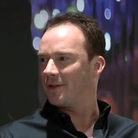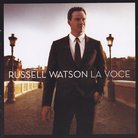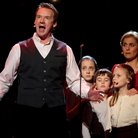Russell Watson: To Live Or Die
If you stopped people in the street and asked them about Russell Watson, they’d probably be able to tell you that he was nicknamed the People’s Tenor, and that he almost died from a brain tumour. Two brain tumours, if you want to get specific.
It was October 2007 when Watson underwent his second brain operation, which was followed by gruelling rehabilitation and radiotherapy. He felt depleted and exhausted, and had to adjust to the news that for the rest of his life he would have to take daily doses of drugs and hormones to sustain anything like a normal lifestyle, because surgery had damaged his pituitary gland.
Yet here he is four years later, bounding into a hotel lounge in a sunny South Kensington like... not a young gazelle exactly, but more like a stocky midfield dynamo in a stylish tracksuit and a pair of sleek white Porsche- designed trainers. He’s bronzed from a holiday in the Far East, and eagerly promoting his new DVD, filmed earlier in 2011 at the Albert Hall.
“That was a poignant night for me,” he says. “It wasn’t just a guy walking onto the stage and singing a few well-known tunes. I think people in the UK recognise the journey, for want of a better word, that’s I’ve been on for the last 10 years, the highs and lows. They see me as an organic human being, somebody they can relate to and who’s been through the type of things that normal people go through.”
Entitled Russell Watson – Return Of The Voice, the DVD uses 18 cameras to capture Watson up close and at full blast, delighting shrieking hordes of fans with a selection of show tunes, Neapolitan songs and popular standards. It’s more like a street party than a concert, and the event climaxes with Watson, draped in the Union Jack, doing his own version of the Last Night of the Proms with Jerusalem and Land Of Hope And Glory.
“I’ve always been very patriotic,” he declares. “I’m very proud of my country and I’m proud to be British. The fans love it too, and I love the sense of euphoria I get watching them from the stage. It inspires them and it inspires me.”
The People’s Tenor, the Voice, and now the comeback kid, Watson’s life is starting to look suspiciously like the raw material for a Hollywood biopic. In the late 1980s he was a salt-of-the-earth lad from Salford, working as a bolt-cutter and supplementing his income by singing in clubs in the North West. It was the secretary at Wigan Road Working Men’s Club who gave him a shove towards opera when he suggested he have a go at Puccini’s Nessun Dorma. Watson insists he pronounced it ‘Neston Doormat’.
“I toddled off and initially learned it phonetically, parrot fashion, and the first time I sang it the pitch was lowered by a third, maybe more. But I got a standing ovation, it was the first operatic piece I ever sang, and that was really where it all started for me.”
The post-operative Watson has worked hard on his singing technique, and has been delighted to find that his vocal range has deepened and expanded, but he has never been bothered about pleasing the opera critics.
His calling card was always a brash, cocky self-confidence, as exemplified by his 2001 debut album, The Voice. Its resounding mix of pop songs and operatic arias topped the classical charts on both sides of the Atlantic, and his duet with Happy Mondays’ Shaun Ryder on Barcelona announced that however operatic he might sound, Watson was still one of the boys at heart.
The follow-up album, Encore, was another smash, but Watson’s take-no-prisoners approach to his singing began to take its toll. “I’d go out and tear it up every night, hitting B flats for fun and B naturals for even more fun, and wouldn’t give it a second thought. I can’t believe I used to sing rock songs and opera pieces on the same night.
“Then the vocal problems came in 2003. I remember laughing at some writer who said, ‘If Watson keeps singing in this fashion he won’t have a voice in five years,; and he was right. Well, actually he was wrong - it was only three years.”
Alarm bells jangled when Watson had to have a growth removed from his vocal cords, but he successfully bounced back with 2005’s Amore Musica. Yet far graver difficulties lay ahead; when he flew to Los Angeles in 2006 to record That’s Life, the agonising headaches he’d been experiencing were diagnosed as a pituitary adenoma. It was the start of a tortuous process that has transformed his life.
“I always felt there was a lot of warmth and support for me during the tough times, and that helps,” he reflects, “but the fact of the matter is that I’m an insanely driven human being. I just simply refused to give in.
“When I was ill for the second time, lying in the MRI scanner with tubes shoved into me, I felt I had a choice of whether I wanted to carry on or whether I just wanted to give up, to live or die. It’s that drive in me that has seen me last 12 years as a recording artist, and it got me through the health issues as well.”
Always a fitness fanatic keen on running, kick-boxing and weight training, Watson was appalled to find he’d gained three and a half stone during his arduous drug and radiotherapy treatments.
“I believe it’s imperative that we set ourselves goals in life,” he says, ‘”and my first objective when I came out of radiotherapy was to get fit.”
His doctor urged him to take it easy for a couple of months before trying even light exercise. Watson responded by booking himself a session at Total Fitness the following morning.
“The manager was standing there with a wheelchair. I said, ‘I’m fine, I’m going to walk in,’ but I did feel terrible. I walked up two flights of stairs and I was completely exhausted. I realised it was going to be a heck of struggle to regain my fitness - but I did.’
Watson has to take hydrocortisone tablets to wake up in the morning and must inject himself with hormones every night, but he insists that “I’m about as happy and content as I’ve ever been.”
He reached an amicable agreement with his ex-wife, Helen, whereby he gets plenty of time with his daughters, and has been taking an active grip on all aspects of his resurgent career.
“I learned the hard way that you have to be a businessman as well as a singer,” he says. “It’s rare these days that anybody gets past their second or third album, and to survive you can’t just walk onstage and sing. It’s relatively easy to attain success, but maintaining it is a completely different story.”
His unstinting battle to drag himself back to stage and recording studio is beginning to pay dividends, and he detects new opportunities opening up.
“There was a sense that people saw me as a sick person, but at last they’re looking at Russell Watson and saying ‘He’s reliable, let’s get him on.’ I don’t feel like a victim any more, I feel like a survivor. I’m very fortunate to still be here, and I intend to make the most of it.”







